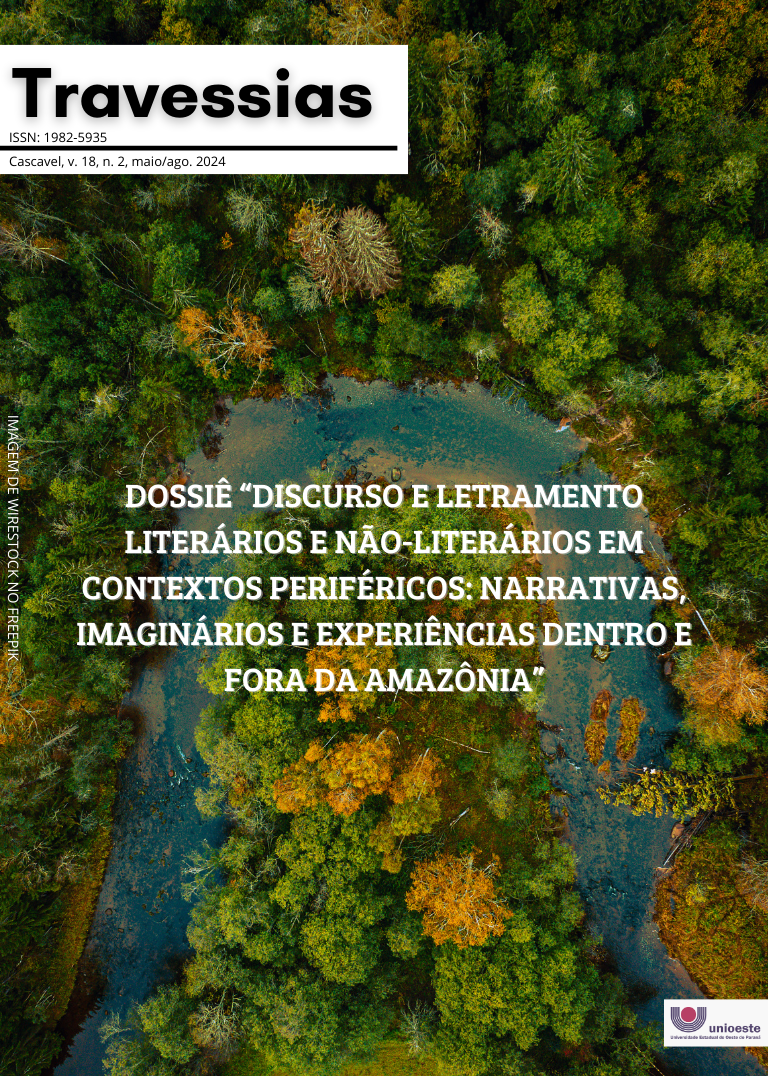The sign of the beast
an anthropophagic reading of “O som do rugido da onça”, by Micheliny Verunschk
DOI:
https://doi.org/10.48075/rt.v18i2.32976Keywords:
Jaguar, Revenge, Anthropophagy, Brazilian LiteratureAbstract
This article seeks to analyze the symbolism of the beast as an element that dialogues with Oswald's anthropophagy in the novel “O som do rugido da onça”, by pernambucan writer Micheliny Verunschk. We will seek to demonstrate how the figure of the animal operates a fruitful symbiosis with the protagonist, the indigenous child Iñe-e, and represents the search for appropriation and revenge in the face of colonialist violence, throughout the literary representation of the national formation proposed by the author . The swallowing of the language, culture and historiography of the colonizer are the starting point, therefore, for the “revenge” established by the authors, who devour the other to denounce the erasure imposed on subjects marginalized by official discourses. In this sense, we turned to researchers such as Ailton Krenak (2019), Eduardo Viveiros de Castro (2002) and Heloísa Toller Gomes (2011) to think about the possibilities of revitalizing the anthropophagic metaphor based on a critical reading of our historiography, highlighting the jaguar as a key of reading to value the importance of original peoples. We will seek to prove, therefore, how contemporary Brazilian literature confirms itself, above all, as an initiative of anthropophagic re-elaboration, since, in addition to subverting the centrality of the European element, it proposes the critical conception of a national identity that is not closed in on itself.
Downloads
References
ANDRADE, O. Manifesto Antropófago. In: ANDRADE, O. A utopia antropofágica. São Paulo: Globo, 2011.
GOMES, H. T. “A questão racial da antropofagia oswaldiana”. In: ROCHA, J. C. C.; RUFFINELLI, J. (org.). Antropofagia hoje?: Oswald de Andrade em Cena. São Paulo: É Realizações, 2011.
HALL, S. A identidade cultural na pós-modernidade. Trad. Guacira Lopes Louro. Rio de Janeiro, DP&A: 2006.
KRENAK, A. Ideias para adiar o fim do mundo. São Paulo: Companhia das Letras, 2019.
KRENAK, A. Futuro ancestral. São Paulo: Companhia das Letras, 2019.
MEDEIROS, D. Livro ‘O som do rugido da onça’ expõe violências do passado que reverberam no presente. Folha de Pernambuco, Recife, ano 17, 22 mar. 2021. Disponível em: https://www.folhape.com.br/cultura/livro-o-som-do-rugido-da-onca-expoe-violencias-do-passado-que/176927 . Acesso em: 18 jun. 2024.
NUNES, B. Antropofagia ao alcance de todos. In: ANDRADE, O. Obras Completas: A utopia antropofágica. São Paulo: Globo, 2011.
ROCHA, J. C. C.; RUFFINELLI, J. (org.). Antropofagia hoje?: Oswald de Andrade em Cena. São Paulo: É Realizações, 2011.
SANTIAGO, S. O começo do fim. Gragoatá, Niterói, n. 24, p. 13-30, jan./jun. 2008. Disponível em: https://periodicos.uff.br/gragoata/article/view/33156/19143. Acesso em: 18 jun. 2024.
SANTIAGO, S. O entre-lugar do discurso latinoamericano. In: SANTIAGO, S. Uma literatura nos trópicos: ensaios sobre dependência cultural. Rio de Janeiro, Rocco: 2000. p. 11-28
SANTIAGO, S. Fechado para balanço: 60 anos de modernismo. Rio de Janeiro: PUC - Divisão de Intercâmbio e Edições, 1982.
SANTIAGO, S. Vale quanto pesa: ensaios sobre questões político-culturais. Rio de Janeiro: Paz e Terra, 1982.
SPIVAK, G. C. Pode o subalterno falar? Trad. Sandra Regina Goulart Almeida, Marcos Pereira Feitosa e André Pereira. Belo Horizonte: Editora da UFMG, 2010.
STERZI, E. Dilética da devoração e devoração da dialética. In: ROCHA, J. C. C.; RUFFINELLI, J. (org.). Antropofagia hoje?: Oswald de Andrade em Cena. São Paulo: É Realizações, 2011.
VERUNSCHK, M. O som do rugido da onça. São Paulo: Companhia das Letras, 2021.
VIVEIROS DE CASTRO, E. A inconstância da alma selvagem. São Paulo: Cosac & Naify, 2002.
Downloads
Published
How to Cite
Issue
Section
License
Copyright (c) 2024 Authors keep the copyright and grant the journal the right of first publication, with the work simultaneously licensed under the Creative Commons Attribution License (CC-BY-NC-SA 4.0), which allows sharing the trial with acknowledgment of authorship and initial publication in this journal.

This work is licensed under a Creative Commons Attribution-NonCommercial-ShareAlike 4.0 International License.
Creative Copyright Notice
Policy for Free Access Journals
Authors who publish in this journal agree to the following terms:
1. Authors keep the copyright and grant the journal the right of first publication, with the work simultaneously licensed under the Creative Commons Attribution License, which allows sharing the trial with acknowledgment of authorship and initial publication in this journal.
2. Authors are authorized to take additional contracts separately, for non-exclusive distribution of the work version, published in this journal (eg publish in institutional repository or as a book chapter), with acknowledgment of authorship and initial publication in this journal.
3. Authors are allowed and encouraged to publish and distribute their work online (eg in institutional repositories or on their personal page) at any point before or during the editorial process, as this can generate productive changes, as well as increase both impact and citation of the published trial (See The Effect of Free Access).
Creative Commons License
This work is licensed under a Creative Commons Attribution–NonCommercial-shareaswell 4.0 International License, which allows you to share, copy, distribute, display, reproduce, completely or part of the work, since there is no commercial purpose, and authors and source are cited.



